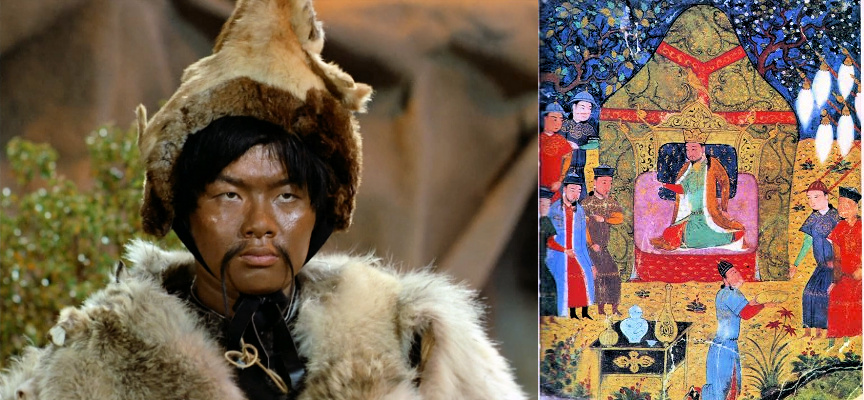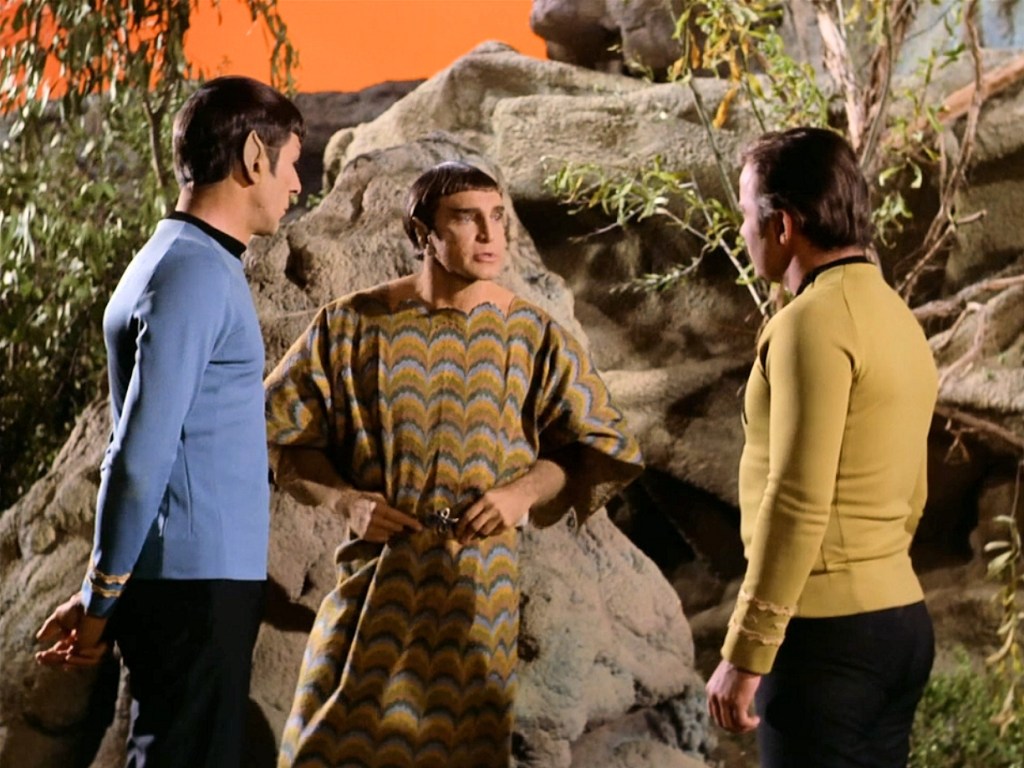(Note: If you haven’t read it yet, my introductory post on this Star Trek: The Original Series rewatch is a good place to start.)
Original Air Date: March 7, 1969
Crew Death Count: 0
Bellybuttons: 0 (Zora’s wardrobe is a near miss)
“The Savage Curtain” is a face-palm of an episode, but, if nothing else, it deserves to be remembered for introducing Surak and Kahless to the Star Trek universe. This week, the Enterprise orbits Excalbia, a planet with a molten lava surface and poisonous atmosphere (poisonous to humanoids, at any rate), when sensors detect evidence of a civilization. Suddenly, Abraham Lincoln (Lee Bergere) floats into the viewscreen, waiting for a tour of the Enterprise. It’s a prelude to bringing Kirk and Spock to the planet’s surface, where the Excalbians have orchestrated a death match between the opposing philosophies of “good” and “evil,” with Kirk, Spock, Lincoln, and Vulcan philosopher Surak (Barry Atwater) on Team Good, and Team Evil made up of Colonel Green (Phillip Pine), Genghis Khan (Nathan Jung), evil scientist Zora (Carol Daniels DeMent), and former Klingon emperor Kahless (Robert Herron).

“The Savage Curtain” contains elements of “Arena” and “Spectre of the Gun,” both of which are better episodes. While those earlier episodes didn’t have the Excalbians’ flimsy claim of philosophical research, both involved life-or-death struggles orchestrated by more powerful alien cultures. We only see one Excalbian but we’re told there are more. The lead Excalbian – identified as Yarnek in the script but never named in the episode – is a rock-like creature, similar to a Horta with arms and legs, a good fit for the planet’s human-incompatible environment. Yarnek (voiced by Bart LaRue with Janos Prohaska in the suit) refers to the forced combat as “drama” and a “play,” giving the impression that the Excalbians are focused more on entertainment than research. Their code of honor – if they have such a thing – seems more in line with Klingons: Yarnek tells Kirk and Spock they should be grateful for the opportunity to conquer evil and demonstrate their superiority. When the landing party fails to see the upside to that, Yarnek forces them to fight by threatening to destroy the Enterprise in four hours if the good guys aren’t victorious.

A greater mystery is why the scenario involves a combination of living and imagined individuals. We know Lincoln, Surak, and Genghis Khan lived in the distant past. The other characters aren’t given much history in the episode, but later canon will indicate that Kahless and Colonel Green lived in the 9th and 21st centuries, respectively. Yarnek claims that if the villains are successful, they will receive the power they seek over others, which makes no sense if we’re talking about illusions. Unless the Excalbians truly revived the dead, which seems unlikely. Just before Lincoln is beamed to the Enterprise, sensors indicate living rock has transformed into a human life form, implying that an Excalbian might have taken Lincoln’s form. Given the Excalbians’ narcissism, it’s unbelievable that they would put themselves directly in harm’s way, “using their fellow creatures as source matter,” yet Spock suggests exactly this late in the episode.

Whether real or not, the villains are presented in a fairly racist and sexist manner. Genghis Khan, for all his notoriety, gets extremely little dialogue and never demonstrates the complex and nefarious conduct of the real Genghis Khan, who was quick to embrace new technologies and strategies while behaving so ruthlessly that anywhere from four to sixty million civilians are believed to have been killed by his conquests. Kahless, despite being a fictional character, also gets short shrift, denied the opportunity to show us what makes him a legend in the TOS universe. Zora, the only woman present, is so trivialized that she is barely even along for the ride. For no valid reason, they are all subservient to the white male, Colonel Green. Zora and Kahless are new to us, but even in 1969 it would have been hard to imagine Genghis Khan behaving so submissively.

Of the illusory characters, Lincoln is the one we spend the most time with. We never really believe he is Lincoln, and, thankfully, neither does the Enterprise crew. Lincoln himself admits, “appearances can be deceiving.” In this regard, Kirk’s response is the most appropriate for an explorer. While McCoy and Scott grumble about Kirk’s plan to beam down to the planet’s surface – a potential trap – Kirk reminds us why we’re here: “The very reason for the existence of our starships is contact with other life. Although the method is beyond our comprehension, we have been offered contact.” This Lincoln is, in some ways, immersed in the time of the real Abraham Lincoln, but in other ways he is up to speed with contemporary circumstances. He is able to track the Enterprise in orbit around Excalbia, and he is aware of the Vulcan philosophy of “Nome,” or “All.” Yet Lincoln, and the writers, also give us the episode’s clumsiest moment, when Lincoln refers to Uhura as a “Negress.” Uhura’s response is not fully in keeping with 1960s progressivism: “You see, in our century, we’ve learned not to fear words.” This moment of anti-wokeness fails to acknowledge that, while we should not fear words, there’s no harm in considering that some terms are rooted in a racist or otherwise toxic history and are better avoided in civilized conversation. Kirk partially redeems the moment when he tells Lincoln, “We’ve each learned to be delighted with what we are. The Vulcans learned that centuries before we did.”

The Excalbians chose Lincoln because they were able to scan the Enterpise computer files and somehow determine the impact a figure like Lincoln would have on Kirk, just as the Melkotians called up the Wyatts and the Earps from Kirk’s frontier value system in “Spectre of the Gun.” Likewise, Surak is present because of his importance to Spock. (Somehow, Kirk has never heard of Surak, which seems implausible, given his quick recognition of T’Pau in “Amok Time” and his observation on Vulcan history only a few minutes earlier.) Surak is the most interesting character in the episode, generally behaving as we would hope from “the father of Vulcan civilization,” the philosopher who set Vulcan on its course of logic over emotion. Rather than taking the elitist attitude of later Vulcans (see numerous episodes of Enterprise), Surak greets Kirk as a fellow explorer: “In my time, we knew not of earth men. I am pleased to see that we have differences. May we together become greater than the sum of both of us.” Surak’s bottom-line perspective agrees with Kirk and even the villainous Green: the Excalbians are their true enemy. During the conflict, however, Surak refuses to take up arms against the evil group, even in self-defense. “Perhaps it is our belief in peace that is actually being tested,” he speculates.

Spock is clearly torn by Surak’s presence, creating an intriguing struggle between Spock’s Vulcan and human heritages. As Kirk plans an assault on Team Evil, Surak expresses his refusal to fight. Spock tells Kirk, “Logic dictates that we consider another course.” When he says this, however, Spock is visibly conscious of being observed by Surak. Is Spock’s reticence sincere or is he posturing for Surak’s benefit? We’ve seen Spock willing, even eager, to go on the offensive – see “Where No Man Has Gone Before” and “A Private Little War” for examples. Spock makes it clear that he will engage in combat if Kirk orders him to. Yet we’ve also observed Spock’s pacifist tendencies, a desire to coexist peacefully, in adventures like “The Devil in the Dark” and “Is There in Truth No Beauty?” This is a clever way of demonstrating the push-and-pull not only between Spock’s Vulcan and human ancestry, but the similar conflict between his foundation of logic and his career in Starfleet.

The difference between Lincoln and Surak, as well as the difference between Kirk and Spock, is well demonstrated by Lincoln’s admonition to Kirk as Lincoln marches off to approach the enemy from the rear and the probability of certain death. Lincoln compares Kirk to Ulysses S. Grant, who was rare among Union (i.e., United States) generals during the Civil War in that he saw the necessity of fighting a war by conducting actual warfare, earning himself the nickname “Unconditional Surrender Grant.” Lincoln reminds Kirk of what the real Lincoln might have felt in strategizing against the secessionist army: “We fight on their level. With trickery, brutality, finality. We match their evil. … I gave orders that sent a hundred thousand men to their death at the hands of their brothers. There’s no honorable way to kill, no gentle way to destroy. There is nothing good in war except its ending.”

Surak’s pacifism, and Lincoln’s distracting maneuver, ultimately cost them their lives, but their deaths are not entirely in vain. Surak and Lincoln, in sacrificing themselves, draw the villains out for a direct assault by Kirk and Spock. This sacrifice – one of Star Trek’s most significant themes – is one of the crucial differences between good and evil. When the forces of evil are on the verge of defeat, their leader, Green, turns tail and runs when confronted by Kirk. While Lincoln and Surak willingly marched into danger, Green flees. Yarnek acknowledges this in declaring Kirk and Spock the victors (Congressional Democrats take note): “It would seem that evil retreats when forcibly confronted.”

The episode reduces good and evil into simplistic cartoon terms; that, combined with the comical effect of Lincoln cavorting around in his stovepipe hat, gives the struggle considerably less gravitas than the more nuanced and compelling struggle between Kirk and the Gorn in “Arena.” Likewise, the episode is too human-centric – why involve a multi-species cast of characters but go no further than a cops-and-robbers scenario to explore good vs. evil? Amidst all of this, the episode’s most important message is nearly lost: never lose sight of the true enemy. Even Colonel Green raises the point – “We have a common cause. And our enemy is that creature.” – but lacks the sincerity to commit to the principle. This belief – that the two groups of combatants would be better off pursuing freedom together instead of fighting each other – is what motivates Surak to risk his life with a peace offering. Any fool can be manipulated into chasing after false enemies – the current state of the Republican Party is all the evidence we need of that. The integrity to unite around a common need is one of the true distinctions between good and evil; Surak’s willingness to risk his life for that reason is why Kirk calls him brave. The ability to rise above the heat of the moment, rather than recklessly charging into combat, requires an individual who is truly courageous. As Spock reminds Kirk, and us: “Men of peace usually are.”
Next: All Our Yesterdays